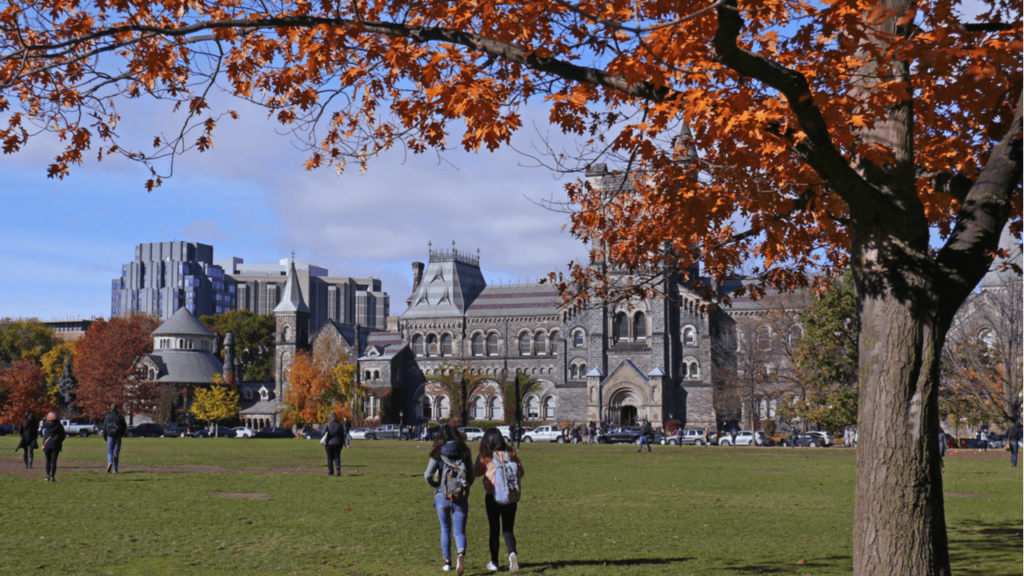Table of Contents
ToggleTop Courses in Canada 2025 Guide for International Students

1. Introduction to Top Courses in Canada
Canada is one of the most popular study destinations for international students due to its high-quality education system, diverse culture, and globally recognized degrees. The Top Courses in Canada cover a wide range of fields, from engineering and business to healthcare and creative arts. Whether you’re pursuing undergraduate, postgraduate, or diploma studies, Canada offers programs designed to prepare students for successful careers in a global market.
2. Why Study in Canada?
Canada is known for its inclusive environment, strong academic infrastructure, and high employment rates for graduates. Studying the Top Courses in Canada gives students access to world-class facilities, expert faculty, and opportunities for research and internships. Additionally, the country’s Post-Graduation Work Permit (PGWP) allows international students to gain valuable work experience after completing their studies.
3. Best Undergraduate Courses in Canada
Some of the most sought-after undergraduate programs include:
Computer Science & Information Technology Leading to careers in software development, cybersecurity, and AI.
Engineering Mechanical, Civil, and Electrical Engineering are in high demand.
Business Administration Covers management, marketing, and entrepreneurship.
Health Sciences Nursing, Pharmacy, and Physiotherapy programs are highly respected.
4. Best Postgraduate Courses in Canada
Postgraduate education in Canada is equally prestigious. Popular choices include:
MBA (Master of Business Administration) Offered by top institutions like Rotman and Schulich.
Master’s in Data Science Meeting the global demand for data analytics experts.
Environmental Science Canada’s rich natural resources make it ideal for sustainability studies.
Education and Teaching For those aiming to shape the next generation.
5. Short Term and Diploma Courses in Canada
Many students opt for diploma or certificate programs for skill development. These include:
Digital Marketing
Hospitality Management
Graphic Design
Culinary Arts
These programs are cost-effective, shorter in duration, and offer quick entry into the workforce.
6. Admission Requirements
Admission to the Top Courses in Canada generally requires:
Academic transcripts
Proof of English proficiency (IELTS/TOEFL)
Statement of Purpose (SOP)
Letters of Recommendation (LORs)
7. Tuition Fees and Scholarships
Tuition fees vary depending on the program and institution, ranging from CAD 15,000 to CAD 50,000 per year. Scholarships are available based on merit, need, or field of study, making the Top Courses in Canada accessible to talented students worldwide.
8. Career Opportunities After Graduation
Graduates from Canadian institutions enjoy high employability in fields like technology, healthcare, finance, and engineering. The country’s immigration policies also support students who wish to work and settle in Canada
Why Study in Canada

Canada has earned its place as one of the most sought-after destinations for international students, thanks to its exceptional education system, safe environment, and welcoming multicultural society. Each year, thousands of students from around the globe choose Canada not only for its academic excellence but also for its emphasis on innovation, research, and career readiness.
One of the biggest reasons students are drawn to Canada is the high quality of its universities and colleges. Institutions such as the University of Toronto, McGill University, and the University of British Columbia consistently rank among the world’s best. The Top Courses in Canada are designed to meet global industry standards, ensuring that graduates are well-prepared for professional success. Whether your interest lies in engineering, business, health sciences, or technology, you’ll find a wide range of programs tailored to your goals.
Another compelling reason to study in Canada is its strong focus on research and innovation. The country invests heavily in scientific research, offering students the opportunity to work on groundbreaking projects alongside experienced faculty. Many of the Top Courses in Canada integrate practical experience, internships, and cooperative education programs, giving students a competitive edge in the job market.
Canada’s Post Graduation Work Permit (PGWP) is another significant advantage. It allows international students to work in Canada for up to three years after completing their studies, opening the door to permanent residency for those who wish to build their careers there. This pathway makes Canada not only a great place to study but also a potential home for the future.
Beyond academics, Canada offers an outstanding quality of life. It is known for its breathtaking landscapes, vibrant cities, and safe, inclusive communities. The country embraces diversity, making it easier for students from all cultural backgrounds to adapt and thrive.
Finally, studying in Canada can be more affordable compared to other top destinations like the USA or UK. With reasonable tuition fees, various scholarships, and the ability to work part-time during studies, students can manage their expenses effectively while pursuing the Top Courses in Canada.
In short, Canada offers a blend of academic excellence, career opportunities, and an enriching lifestyle making it one of the best places in the world to achieve your educational dreams
Best Undergraduate Courses in Canada

Best Undergraduate Courses in Canada
Canada is home to some of the most prestigious universities in the world, offering diverse and high-quality undergraduate programs. International students are particularly drawn to the Best Undergraduate Courses in Canada because they combine academic rigor with practical, career focused learning opportunities. Whether your interests are in the arts, sciences, engineering, or business, Canadian institutions provide a world-class foundation for your future career.
One of the most popular study areas is Engineering and Technology. Universities like the University of Toronto, University of British Columbia, and McGill University are recognized globally for their advanced facilities, research opportunities, and industry partnerships. Students gain both theoretical knowledge and hands-on experience, preparing them for high-demand roles in civil, mechanical, and software engineering.
Business and Management programs are also a top choice. Canadian business schools emphasize entrepreneurship, leadership, and global business practices. Programs often include internships and co-op opportunities, enabling students to build professional networks before graduation.
For those interested in healthcare, Nursing and Health Sciences rank among the Best Undergraduate Courses in Canada. These programs provide extensive clinical training and prepare students for fulfilling careers in hospitals, clinics, and public health organizations.
The Computer Science and Information Technology field is growing rapidly, and Canadian universities are at the forefront of innovation. Students learn programming, cybersecurity, artificial intelligence, and data science skills that are highly valued in the global job market.
For students passionate about creativity and culture, Arts, Humanities, and Social Sciences programs explore literature, history, psychology, and political science, fostering critical thinking and communication skills.
One of the strengths of the Best Undergraduate Courses in Canada is the inclusion of co-operative education (co-op) programs. These allow students to alternate between academic terms and paid work placements in their field of study. This unique approach not only enriches learning but also helps graduates secure employment more quickly.
Additionally, Canadian degrees are globally recognized, offering graduates the flexibility to work in Canada or anywhere else in the world. The multicultural environment in classrooms encourages students to develop a global perspective an essential skill for the modern workforce.
Choosing to pursue one of the Best Undergraduate Courses in Canada means investing in an education that combines academic excellence, hands on experience, and international career opportunities, making it an ideal choice for ambitious students worldwide
Best Postgraduate Courses in Canada

Best Postgraduate Courses in Canada
Canada has emerged as one of the top destinations for advanced education, attracting thousands of international students each year. The Best Postgraduate Courses in Canada offer a perfect combination of world-class academics, research opportunities, and practical training, making them highly sought after by professionals looking to enhance their qualifications.
One of the most popular options is Master’s in Business Administration (MBA). Canadian universities like the University of Toronto’s Rotman School of Management, McGill University’s Desautels Faculty of Management, and the University of British Columbia’s Sauder School of Business are globally ranked for their innovative curriculum, networking opportunities, and industry connections.
Engineering and Technology postgraduate programs are also highly regarded. Whether it’s civil, electrical, or mechanical engineering, these courses integrate cutting edge research with real world applications. Graduates often find opportunities in Canada’s robust engineering and manufacturing sectors.
For students interested in healthcare, Public Health, Nursing, and Biomedical Sciences are among the Best Postgraduate Courses in Canada. These programs provide specialized training in advanced healthcare practices, policy-making, and medical research skills that are in demand worldwide.
Computer Science and Data Analytics programs are rapidly gaining popularity due to the growing need for tech professionals. Universities offer specialized postgraduate degrees in artificial intelligence, machine learning, cybersecurity, and big data, preparing graduates for high-paying careers in the tech industry.
Another strong area is Environmental Science and Sustainability. Canada’s focus on sustainable development and climate change solutions makes it an ideal place to study programs that combine scientific knowledge with environmental policy and management skills.
In addition to academic excellence, the Best Postgraduate Courses in Canada often include research projects, internships, and co op programs that allow students to apply their knowledge in professional settings. This blend of theory and practice not only enhances learning but also increases employability.
Canadian postgraduate degrees are internationally recognized, which means graduates can pursue careers globally. Many programs also provide pathways to permanent residency, making them an attractive option for those wishing to build a future in Canada.
By choosing one of the Best Postgraduate Courses in Canada, students invest in a high-quality education, gain valuable international exposure, and open doors to a world of career opportunities across multiple industries.
Popular Short Term Courses in Canada

Popular Short-Term Courses in Canada
Canada is not only known for its degree programs but also for its wide range of short-term and certificate courses that cater to both local and international students. The Popular Short-Term Courses in Canada are ideal for those who want to upgrade their skills, switch careers, or gain industry-specific knowledge in a shorter time frame without committing to a multi-year degree.
One of the most in-demand short courses is Business and Management certification programs. Offered by institutions like the University of Toronto, McGill University, and Humber College, these courses cover topics such as project management, digital marketing, and entrepreneurship, giving students practical skills to advance in their careers.
Information Technology and Computer Skills short-term courses are also highly sought after. Whether it’s web development, cybersecurity, cloud computing, or data analytics, these programs prepare students for the rapidly evolving tech industry. Many are designed with industry input, ensuring that graduates have the skills employers are actively seeking.
For those interested in creative fields, Canada offers Graphic Design, Animation, and Photography short courses that blend artistic techniques with modern software skills. Institutions like Sheridan College and Vancouver Film School are especially popular for these programs.
In the healthcare sector, Popular Short-Term Courses in Canada include Healthcare Administration, Medical Office Assistance, and First Aid Training. These courses are practical, hands on, and lead to quick employment opportunities in clinics, hospitals, and community health organizations.
Hospitality and tourism courses are also a favorite among international students. With Canada being a popular tourist destination, certifications in Hotel Management, Culinary Arts, and Event Planning help students step into vibrant and fast-growing industries.
Another growing field is Environmental Studies and Sustainability. These short programs provide essential knowledge about eco-friendly practices, renewable energy, and climate change mitigation skills that are increasingly important in today’s job market.
Most short-term courses range from a few weeks to one year in duration and are offered by universities, colleges, and private institutions across Canada. They are typically more affordable than degree programs and often include flexible learning options, such as evening or online classes, making them accessible to working professionals.
Choosing from the Popular Short Term Courses in Canada allows students to gain specialized expertise, enhance their resumes, and improve job prospects quickly all while experiencing the multicultural and welcoming environment that Canada is famous for
Cost of Studying Top Courses in Canada

Cost of Studying Top Courses in Canada
Understanding the Cost of Studying Top Courses in Canada is essential for international students planning their academic journey. While Canada offers world-class education, the expenses can vary significantly depending on the institution, program, and city you choose.
For undergraduate programs, tuition fees for top courses such as Engineering, Business Administration, and Computer Science typically range between CAD 15,000 and CAD 30,000 per year. Prestigious universities like the University of Toronto, McGill University, and the University of British Columbia are on the higher end, while smaller universities and colleges may offer more affordable options.
Postgraduate programs, including master’s degrees and MBAs, generally cost between CAD 18,000 and CAD 40,000 annually. Specialized programs such as Medicine, Dentistry, and Law can be more expensive, sometimes exceeding CAD 50,000 per year.
Short-term and diploma programs are more budget-friendly, with fees ranging from CAD 5,000 to CAD 15,000, depending on the subject and institution. Many international students opt for these programs as a cost-effective way to gain Canadian credentials and work experience.
In addition to tuition, students should budget for living expenses. On average, living costs in Canada range from CAD 10,000 to CAD 15,000 per year. This includes accommodation, food, transportation, utilities, and personal expenses. Cities like Toronto and Vancouver tend to be more expensive, while smaller cities such as Halifax, Winnipeg, or Quebec City offer more affordable living options.
Books and study materials can cost an additional CAD 500 to CAD 1,500 annually. Health insurance is mandatory for international students, with rates varying by province usually between CAD 600 and CAD 900 per year.
When calculating the Cost of Studying Top Courses in Canada, it’s important to consider other fees, such as student services, lab fees, and extracurricular activities, which can add a few hundred dollars to your annual expenses.
To manage costs, many students take advantage of part-time work opportunities during their studies, as Canada allows up to 20 hours of work per week during academic
Scholarships for Top Courses in Canada

Scholarships for Top Courses in Canada
Pursuing higher education abroad can be expensive, but Scholarships for Top Courses in Canada make it possible for talented international students to achieve their dreams. Canada offers a wide range of scholarship programs funded by universities, the government, and private organizations to support both undergraduate and postgraduate students.
One of the most prestigious awards is the Vanier Canada Graduate Scholarship, which provides CAD 50,000 per year for three years to exceptional doctoral students in fields like health research, natural sciences, engineering, and social sciences. For master’s students, the Canadian Commonwealth Scholarship Program and the Ontario Graduate Scholarship (OGS) offer generous funding to support academic excellence.
Universities also have their own merit-based and need-based scholarships. For example, the University of Toronto’s Lester B. Pearson International Scholarship covers tuition, books, incidental fees, and living expenses for four years of undergraduate study. Similarly, McGill University’s Entrance Scholarships reward outstanding academic achievement, while the University of British Columbia International Leader of Tomorrow Award provides financial assistance based on merit and need.
In addition to university specific awards, there are targeted scholarships for students enrolling in certain disciplines. For instance, the Pierre Elliott Trudeau Foundation Scholarships focus on doctoral research in the humanities and social sciences, while engineering students may benefit from programs like the Engineers Canada Scholarships.
When searching for Scholarships for Top Courses in Canada, students should also explore provincial funding opportunities. For example, the Quebec Merit Scholarship for Foreign Students supports research students in Quebec, while the Ontario Trillium Scholarship offers CAD 40,000 per year for PhD students in Ontario.
Many scholarships require strong academic performance, extracurricular involvement, leadership skills, and community service. Most applications demand transcripts, reference letters, a statement of purpose, and sometimes proof of financial need. Early application is key, as deadlines can be months before the start of the academic year.
Apart from full scholarships, partial awards, tuition waivers, and bursaries can significantly reduce the financial burden. Even small scholarships can help cover costs for books, supplies, or living expenses, making them worth pursuing.
In conclusion, Scholarships for Top Courses in Canada open the door for ambitious students to access world class education without the full financial burden. With proper research, preparation, and timely applications, international students can maximize their chances of securing funding for their studies in Canada.
How to Apply for Top Courses in Canada

How to Apply for Top Courses in Canada
Applying for Top Courses in Canada requires careful planning, attention to detail, and meeting all admission requirements set by universities and colleges. The process is straightforward, but competition is high especially for popular programs so starting early is crucial.
Step 1: Research Your Course and Institution
Begin by identifying the Top Courses in Canada that align with your career goals, budget, and preferred location. Consider factors like program content, university rankings, faculty expertise, and internship opportunities. Most universities have dedicated websites where you can explore program details, admission deadlines, and tuition fees.
Step 2: Check Eligibility Requirements
Each program has specific academic requirements. Undergraduate applicants usually need to submit their high school transcripts, while postgraduate applicants must provide bachelor’s degree certificates. Additional prerequisites such as standardized test scores (e.g., IELTS, TOEFL, GRE, GMAT) or relevant work experience may also apply.
Step 3: Prepare Required Documents
Typical documents for Canadian university applications include:
Academic transcripts and certificates
Proof of English or French language proficiency
Statement of Purpose (SOP)
Letters of recommendation
Updated resume or CV
Portfolio (for creative courses)
Step 4: Submit Applications
Applications can be submitted online directly through the university’s portal or via centralized application systems like OUAC (Ontario Universities’ Application Centre). Make sure to meet all deadlines, as late applications are often rejected.
Step 5: Pay Application Fees
Most institutions require a non-refundable application fee, ranging from CAD 50 to CAD 250, depending on the program.
Step 6: Wait for the Offer Letter
If accepted, you’ll receive an official offer letter. Review the terms carefully, confirm your acceptance, and pay any required deposits.
Step 7: Apply for a Study Permit
Once you have an acceptance letter, apply for a Canadian study permit through the Immigration, Refugees and Citizenship Canada (IRCC) website. This step is mandatory for most international students.
Step 8: Arrange Accommodation and Travel
After securing your visa, finalize housing arrangements either on campus or off-campus and book your travel to Canada.
Tips for International Students in Canada

Tips for International Students in Canada
Studying abroad is an exciting adventure, and for those enrolled in Top Courses in Canada, the experience can be both academically rewarding and culturally enriching. To make the most of your time in the country, it’s important to prepare well, adapt to a new environment, and stay informed about resources available to international students.
1. Understand Canadian Culture and Etiquette
Canada is known for its diversity, politeness, and inclusivity. Be respectful of cultural differences, practice patience in queues, and greet people with a smile. This will help you integrate quickly into student life and build lasting relationships.
2. Budget Wisely
The cost of living varies by city. Toronto and Vancouver tend to be more expensive, while cities like Halifax or Winnipeg are more affordable. Create a monthly budget covering rent, groceries, transportation, and entertainment. Students in Top Courses in Canada often benefit from student discounts, so always carry your student ID.
3. Stay on Top of Academic Requirements
Canadian universities value participation, independent research, and critical thinking. Attend lectures regularly, meet deadlines, and make use of campus facilities like libraries, tutoring centers, and study groups.
4. Explore Work Opportunities
International students with valid study permits can work up to 20 hours per week during academic sessions and full-time during breaks. This not only helps with expenses but also builds professional experience.
5. Stay Healthy and Insured
Health insurance is mandatory in most provinces for international students. Check whether your university offers a health plan or if you need to purchase one separately. Maintain a balanced diet, stay active, and make use of student wellness services.
6. Network and Join Student Organizations
Universities offer numerous clubs, associations, and cultural groups. Joining these can help you make friends, expand your network, and improve your communication skills.
7. Embrace Canadian Weather
Winters can be harsh, especially in provinces like Manitoba and Saskatchewan. Invest in warm clothing, including a good winter coat, gloves, and waterproof boots.
8. Travel and Explore
Canada offers breathtaking landscapes and vibrant cities. Use weekends and breaks to explore national parks, museums, and cultural festivals.
Final Thoughts

Final Thoughts
Choosing to study abroad is one of the most important decisions you will make for your future, and Canada continues to stand out as a top choice for students worldwide. Known for its high academic standards, multicultural environment, and safe communities, Canada offers more than just a degree—it offers an experience that can shape your personal and professional life.
When selecting from the Top Courses in Canada, it’s essential to consider your career goals, academic interests, and long-term plans. Whether you’re pursuing an undergraduate degree, a postgraduate program, or a short-term course, Canada’s universities and colleges provide the quality education and global recognition that can open doors to international opportunities.
The country’s focus on research, innovation, and practical learning ensures that students are not only well-prepared academically but also equipped with the skills needed in today’s competitive job market. Beyond academics, you’ll have the chance to immerse yourself in a vibrant culture, explore breathtaking landscapes, and form lifelong friendships with people from all over the world.
Ultimately, studying in Canada is about more than earning a qualification—it’s about personal growth, building a global perspective, and setting a strong foundation for a successful career. By carefully researching and choosing the Top Courses in Canada, you can ensure that your educational journey is both fulfilling and impactful
FAQs
Q1. What are the Top Courses in Canada for international students?
Some of the Top Courses in Canada include Computer Science, Engineering, Business Administration, Nursing, Data Science, and Hospitality Management.
Q2. Are the Top Courses in Canada expensive to study?
Tuition fees vary depending on the program and institution. On average, undergraduate courses cost CAD 15,000–30,000 per year, while postgraduate courses can range from CAD 18,000–35,000 per year.
Q3. Can I work while studying Top Courses in Canada?
Yes, international students can work up to 20 hours per week during academic sessions and full-time during scheduled breaks.
Q4. Do I need IELTS to study the Top Courses in Canada?
Most Canadian universities require proof of English proficiency through IELTS, TOEFL, or other accepted language tests unless you meet exemption criteria.
Q5. Are scholarships available for Top Courses in Canada?
Yes, many universities, colleges, and government programs offer scholarships to international students based on merit, financial need, or specific fields of study.
Q6. Can I get a work permit after completing Top Courses in Canada?
Graduates from eligible institutions can apply for a Post-Graduation Work Permit (PGWP), which allows them to work in Canada for up to three years






